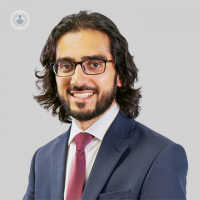Preventive cardiology: The key to a healthy heart
Written in association with:Although genetics can impact cardiovascular disease risk, key lifestyle changes, such as maintaining a healthy weight and eating a balanced diet, can significantly reduce your likelihood of developing heart disease. In this informative guide for patients, esteemed consultant cardiologist Professor Riyaz Patel shares his expert insight on preventive cardiology and reveals how risk factors related to cardiovascular disease can be identified and managed.

What is preventive cardiology?
Preventive cardiology is a specialty of cardiology that aims to prevent and manage cardiovascular disease (CVD) by identifying and controlling risk factors such as high cholesterol and high blood pressure, amongst others. It also uses non-invasive tests to detect and treat early damage to the heart and blood vessels. Preventive cardiology can improve the quality of life and life expectancy of people with or at risk of CVD.
What are the most common risk factors associated with cardiovascular disease?
The most important behavioural risk factors of heart disease and stroke include:
- eating an unhealthy diet
- physical inactivity
- smoking
- excessive consumption of alcohol
Over time, risk factors such as high blood pressure, raised blood glucose and blood lipids, and obesity are also indicative of a patient being at high risk of cardiovascular disease. Conditions like hyperlipidaemia and diabetes can also raise a person’s cardiovascular disease risk level.
Can genetics be related to cardiovascular disease risk?
Yes, genetics can play a role in the development of cardiovascular disease. Some types of heart disease are hereditary and can be passed down from one generation to the next. However, having a genetic predisposition to heart disease does not mean that you will definitely develop it. Lifestyle factors such as diet and exercise also play a significant role in the development of heart disease.
What does preventive cardiology involve?
Preventive cardiology is a practice performed by cardiologist for patients who are at risk of suffering from cardiovascular problems or who already have them. Through a sequence of medical appointments, as well as diagnostic and preventive tests and treatments, the specialist aims to identify and treat the early onset of any cardiovascular disease. In many cases, electrocardiogram (ECG), Holter pressure, and echocardiogram examinations may be performed in preventive cardiology. The goal of preventive cardiology is to reduce risk factors and prevent any signs of disease from getting worse.
When should you see a doctor about your risk of cardiovascular disease?
You should see a doctor about cardiovascular disease risk if you have any of the following risk factors:
- high blood pressure
- high cholesterol
- diabetes
- obesity
- a history of smoking
- family history of heart disease
You should also see a doctor if you experience any symptoms of heart disease such as chest pain, shortness of breath, or palpitations.
If you are concerned about your risk of cardiovascular disease and wish to schedule a consultation with Professor Patel, you can do so by visiting his Top Doctors profile.


